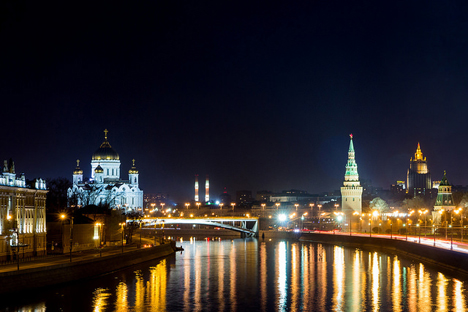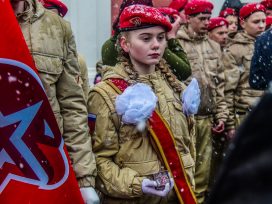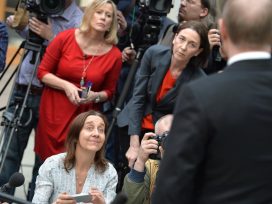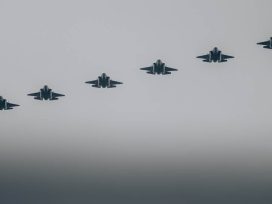In the months since Boris Nemtsov was murdered in February 2015, the Kremlin has floated numerous explanations for his death. Vladimir Putin has called his killing a “provocation” – a strange word. What Putin refers to here is that whoever murdered Nemtsov did so to discredit the state. Since the state is the primary victim here, the state cannot be responsible, this logic runs.

A view from Bolshoy Moskvoretsky Bridge, the bridge that Boris Nemtsov and Anna Duritskaya had just begun to cross when Nemtsov was murdered. Photo: cat_collector. Source:Flickr
Others have blamed Islamist extremists or Ukrainian fascists. Putin’s ally Ramzan Kadyrov, Chechnya’s thuggish president, accused “western spy agencies”, an old favourite. The muckraking website Lifenews.ru, which has close links to the FSB, Putin’s former spy agency, pointed the finger at Nemtsov’s colourful love life. At the time of his murder, he was walking past the Kremlin with a young Ukrainian model, it noted.
The only explanation not being given in Moscow for Nemtsov’s killing late on the evening of Friday 27 February 2015 is the blindingly obvious one: that he was murdered for his opposition activities and, specifically, for his very public criticism of Putin’s secret war in Ukraine in which at least 6000 people have been killed so far, and which – according to his friends – he had been about to expose.
On the margins
Boris Nemtsov had been one of the few Russian liberals brave enough to denounce Putin’s extensive undercover military support for the separatist rebels in Ukraine. He described the way Putin had annexed Crimea, using masked special forces, as “illegal”, though he recognised that a majority of Crimeans wanted to join Russia. In his final interview, on the day of his murder, he denounced Russia’s president as a “pathological liar”.
In the interview with the liberal radio station Echo of Moscow, Nemtsov seemed in good spirits and was in terrific form. He attacked the Kremlin’s “dead-end” politics and mishandling of the economy. This was nothing new for Nemtsov, however, his criticism of the Russian state was longstanding. Since being forced out of Russian parliamentary politics a decade ago, Nemtsov had founded several anti-Putin movements. With state media under the Kremlin’s thumb, though, Nemtsov was banned from TV and he found himself on the margins.
What changed was the war in Ukraine and the unleashing of a wave of nationalist hysteria and hatred on the Russian airwaves. State TV regularly branded Nemtsov as a member of the “fifth column”. After his murder, NTV quietly shelved another anti-Nemtsov hatchet job, entitled Anatomy of a Protest, due to be screened the weekend of his death. By 2015 most other Russian opposition leaders were in exile (the former oligarch Mikhail Khodorkovsky, the ex-chess champion Garry Kasparov) or in jail (the anti-corruption blogger Alexei Navalny).
All of this made Nemtsov especially vulnerable. Moreover, Nemtsov said he had “documentary” proof that undercover Russian soldiers were fighting and dying in eastern Ukraine. It was an assertion borne out by a steady flow of coffins returning in the dead of night from the war zone in Donetsk and Luhansk. According to his friend Ilya Yashin, Nemtsov was preparing an explosive essay on the subject.
Nemtsov had written dissenting pamphlets before. One of them, titled Putin: A Reckoning, accused Russia’s president and his circle of massive personal corruption. Another targeted Yuri Luzhkov, Moscow’s former mayor who was later removed from office. But this new one went to the heart of the Kremlin’s big lie. In the hours after his murder, police seized Nemtsov’s hard drives. There seems little prospect his last polemic will now ever be published.
Yashin says that Nemtsov had scribbled a note for his aide Olga Shorina, which read: “Some paratroopers from Ivanovo have got in touch with me. Seventeen were killed; they did not give them their money, but for now they are frightened to talk.” Yashin followed up the lead and went to Ivanovo, but found relatives there too scared to talk.
“Nemtsov was a Russian patriot, but he also loved Ukraine, the people and the language,” Yashin said. “The war Putin started was traumatic for him, and he wanted to end it.”
A chilling story
In the meantime, the Kremlin has undertaken an old-fashioned cover-up. The week after Nemtsov’s murder, the authorities implausibly announced that the CCTV cameras next to the spot where he was shot dead “were not working”. The politician had had a late dinner with his girlfriend, Ukrainian Anna Duritskaya, in GUM, an upmarket shopping centre. They strolled together across the cobbles of Red Square, then walked past the Kremlin. They started crossing a bridge over the Moscow River. It was 11:30 pm.
According to Duritskaya, someone emerged from a stairwell immediately behind them. Nemtsov was shot in the back. The assassin fired off six shots; four of the bullets struck him, one in the heart; and he died instantly. The killer then escaped in a waiting white car, driven by an accomplice. The car disappeared into the night. Duritskaya told the liberal TV channel Rain she was unable to see the person who fired the fatal shots. Investigators recovered the 9mm bullets, but they did not find a murder weapon.
The location, though, told its own chilling story: an opponent of Putin lying dead in the street, under the walls of Russian power and next to the country’s most famous landmark, St Basil’s Cathedral. The visual scene was perfect for television. It seems extraordinary that a former deputy prime minister could have been murdered here, outside the Russian equivalent of the White House or the Houses of Parliament, with the shooter apparently able to drive off.
Officials initially released one carefully curated CCTV shot taken from far away. A snowplough obscures the moment when Nemtsov is shot. Like all major opposition figures, Nemtsov was under surveillance by the FSB, the successor agency to the KGB. The FSB expends enormous effort on keeping track of its targets. On this occasion, however, an organisation known for its resources and unlimited manpower seemed to have lost track of him.
What happened next was predictable and darkly ridiculous. Investigators arrested a Chechen named Zaur Dadayev, the deputy commander of Chechnya’s north battalion. Dadayev has close links with Ramzan Kadyrov. According to police, Dadyev confessed to shooting Nemtsov. Taking to Instagram, Kadyrov then provided a “motive”: Dadayev had been “shocked” by Nemtsov’s support for the Charlie Hebdo journalists gunned down in Paris on January 7th 2015 over the publication of caricatures of the prophet Muhammad.
Four other suspects were rounded up. Another suspect, Beslan Shavanov, allegedly “blew himself up” when police tried to capture him in the Chechen capital Grozny, officials indicated. Shavanov was a member of the north battalion as well. The suspects were paraded in front of journalists in Moscow, a display of swift justice. Dadayev, however, promptly recanted his confession and said he had been beaten in custody. Human rights groups recorded bruises and cuts on the arms and legs of the others accused.
Kadyrov, meanwhile, described Dadayev as a “patriot” who had only wanted to serve his country. The alleged Chechen plot – real, or half-real, invented – fuelled a further wave of speculation about what was going on at the top of the Kremlin. For ten days in March Vladimir Putin vanished. Was there, as some suggested, a struggle going on between hard-lined factions inside Russian power who wanted to rein in Kadyrov, Putin’s protégé-turned-out-of-control-monster? Was Sergei Ivanov trying to unseat Putin in a palace coup?
Atmosphere of hysteria and hatred
As usual in the impenetrable shadow world of Kremlin politics, there were no empirical answers. Putin reappeared and laughed his disappearance off with a joke: “Without gossip, life would be boring.” Aides said he had been suffering from a cold. The investigation into Nemtsov’s murder increasingly began to resemble the “probe” into the killing of Anna Politkovskya in 2006. There were suspects – or better, fall guys – but no real evidence, no motive, and a lingering sense that those who ordered the murder would escape justice once more.
Certainly, Nemtsov himself had no doubts about who might want him dead. In his final months, Nemtsov voiced growing fears that he might be killed. In one of his last interviews, with the Financial Times, he said Putin was distinctly capable of murder, saying of him: “He is a totally amoral human being. Totally amoral. He is a Leviathan.” Nemtsov went on: “Putin is very dangerous. He is more dangerous than the Soviets were. In the Soviet Union, there was at least a system, and decisions were taken by the politburo. Decisions about war, decisions to kill people, were not taken by Brezhnev alone, or by Andropov either, but that is how it works now.”
We will probably never know who killed Boris Nemtsov. The Kremlin says it is not to blame. Despite this denial, it is entirely possible that the state ordered Nemtsov’s appalling murder, employing a Chechen criminal group as a deniable cover. As many of Nemtsov’s friends have pointed out, Putin deliberately fostered an atmosphere of hysteria and hatred. It is this that allowed Nemtsov to be killed, and so the moral responsibility rests with him, they say. At the start of the investigation Putin said he was taking matters under his personal control. This does not exactly inspire confidence, and led the satirical British magazine Private Eye to run a photo of Putin with the statement as a speech bubble. The president is giving a large wink.
Instead, the Kremlin’s actions since Nemtsov’s murder appear designed to confuse and bamboozle the Russian public. The numerous “versions” of Nemtsov’s murder – from love tiff to Charlie Hebdo-inspired Islamists to “provocation” – are part of a sophisticated postmodern media strategy, with its roots in KGB operational doctrine. How is one supposed to know which version is actually true?
In fact, the aim is to blur what is true with what is not, to the point that the truth disappears. RT (formerly Russia Today), the Kremlin propaganda channel, uses the same methods for western audiences. Its boss, Margarita Simonyan, argues that there is no such thing as truth, merely narrative. Russia’s narrative is just as valid as the “western narrative”, she argues. In this cynical relativist world of swirling competing versions, nothing is really true. And yet someone shot and killed Boris Nemtsov. He was alive. Now he is dead.
Such disinformation methods have been used in previous cases where enemies of the Russian state have mysteriously wound up dead. It is a long list. In October 2006 a gunman murdered Politkovskaya in the stairwell of her Moscow apartment building. In the wake of her killing, Putin dismissed her as pretty much “insignificant” inside Russia, and “merely famous in the West”. After Nemtsov’s death, Dmitry Peskov, Putin’s press spokesman, echoed this. He suggested similarly that Nemtsov was a marginal figure, “scarcely more important than your average citizen”.
Three weeks after Politkovskaya’s murder, two assassins from Moscow bumped off another well-known critic of Putin’s, Alexander Litvinenko. In January 2015, a public inquiry into Litvinenko’s 2006 murder opened at the high court in London. Here, at least, the British police were able to obtain a mountain of evidence: CCTV footage showing Litvinenko at the Mayfair murder scene; call records from the two suspects, Andrei Lugovoi and Dmitry Kovtun; witnesses who were in a hotel bar when Litvinenko swallowed half a cup of radioactive green tea.
The inquiry chairman, Sir Robert Owen, will announce his findings by the end of 2015. He has already indicated that there is a “prima facie case” that this is a Russian state killing. The evidence backs up this interpretation. Lugovoi and Kovtun poisoned Litvinenko with polonium-210, a rare isotope made in a nuclear reactor. Once identified, it is easy to trace. Scotland Yard found a trail of polonium from Moscow to London: on plane seats, hotel rooms, on the shisha pipe (price £9) that Lugovoi smoked in a Moroccan bar. Two former KGB agents allegedly killed Litvinenko, then, using the equivalent of a mini-nuclear bomb.
As with Nemtsov, Putin has denied any involvement. In the meantime, Lugovoi has prospered. He became a deputy in Russia’s state duma for the ultra-nationalist Liberal-Democrats. He has produced his own versions of Litvinenko’s killing, blaming it on MI6, Tony Blair and the late oligarch Boris Berezovsky. In late February he popped up on Russia’s state Rossiya TV channel to share his theories about the Nemtsov murder. While the inquiry heard damning evidence in London, Putin awarded Lugovoi a state honour “for services to the motherland.”
Disturbing pattern
During my four years in Russia as the Guardian‘s bureau chief I covered other similar killings. Stanislav Markelov, a human rights lawyer, was shot dead in 2009 close to the gold-domed Cathedral of Christ the Saviour. Murdered with him was Anastasia Barburova, a 25-year-old journalist with the opposition newspaper Novaya Gazeta. By the time I got to the scene, Markelov’s body had been removed. Vermillion splashes of blood were visible on the white snow. There were few clues. Two neo-Nazis were eventually convicted of their murders.
At the trial of a group of Chechens accused of Politkovskaya’s murder I met Natalia Estemirova, a friend of the murdered journalist, who worked for the human rights organisation Memorial. Estemirova lived in Grozny, Chechnya, and documented human rights abuses by both Islamist rebels and security forces under Kadyrov’s command. In the summer of 2009, gunmen abducted her from her home and drove her to the neighbouring republic of Ingushetia. They marched her off the road into the forest and shot her five times in the head and chest.
Estemirova’s killers have never been caught. Several Chechens were eventually convicted of Politkovskaya’s murder, but the person who organised the hit was never captured and no plausible motive for her murder was ever given. In the absence of dispassionate investigation, a proper legal process or even official regret, the suspicion of state complicity remains. What one can say with certainty is that troublesome critics of the Kremlin have an uncanny habit in Putin’s Russia of ending up dead.
Then there is Sergei Magnitsky. Magnitsky was a Russian lawyer who uncovered a 280 million US dollar fraud by interior minister officials and a Moscow tax office. These same officials put Magnitsky in jail. They demanded he withdraw his testimony against them. He refused. So they denied him access to a doctor and he grew seriously ill. In November 2009 riot police burst into his cell and beat him to death. The Kremlin subsequently put Magnitsky on trial, even though he was already dead, after western countries sanctioned the corrupt officials involved.
On the Sunday after the Nemtsov killing, tens of thousands of mourners filed past the spot where the oppositionist was gunned down. Some held banners that read: “Je suis Nemtsov”; others carried placards which named the “four bullets” that cut him down as Russia’s four state TV channels. In London, protesters held a vigil outside the Russian embassy, with flowers and candles. I asked one Russian friend who she thought was responsible for Nemtsov’s death. Her reply was simple and sad. “Leviathan killed him,” she said.
In late March masked men smashed up the homemade memorial to Nemtsov in the dead of night. This, more than anything, reveals the Kremlin’s real attitude towards Nemtsov – a brave man who spoke truth to power and paid the ultimate price. The following day ordinary Muscovites returned. They came with flowers, candles, banners, and photos of the opposition leader. So long as they keep coming Russia still has hope.







